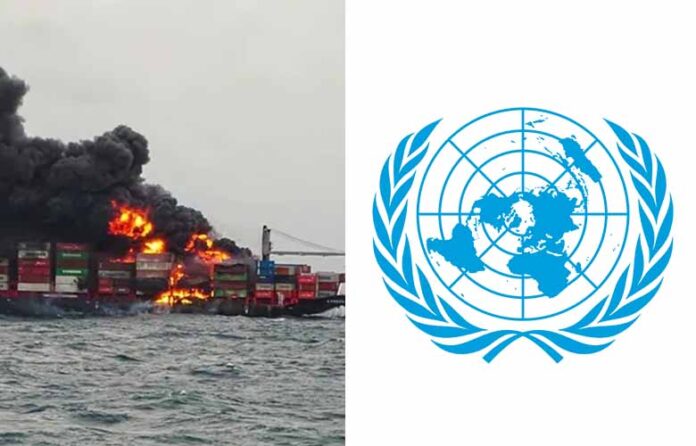September 23, Colombo (LNW): The United Nations office in Sri Lanka has voiced serious alarm over the decision by Singapore-based maritime operator X-Press Feeders to reject a Supreme Court order to pay US$1 billion in compensation for the catastrophic environmental damage caused by the X-Press Pearl vessel.
In a statement shared via its official account on X (formerly Twitter), the UN office described the company’s refusal to comply with the court’s ruling as “deeply concerning”, and called for greater corporate accountability in light of the scale of destruction left in the wake of the disaster.
“We urge the shipping company to reconsider the magnitude of harm caused to affected communities, coastal regions, and marine ecosystems,” the statement read. “Justice must be upheld—not only for the people whose livelihoods have been shattered, but for the environment that continues to suffer the long-term consequences.”
The UN’s comments follow remarks made by X-Press Feeders CEO Shmuel Yoskovitz, who defended the company’s position during an interview with international media. He argued that accepting the Sri Lankan court’s verdict could disrupt the foundations of maritime law by disregarding the long-established principle of limiting liability in international shipping disputes.
Yoskovitz insisted that the decision to decline payment was rooted in legal principle rather than disregard for the incident’s impact. “The judgment poses a threat to the established norms of maritime commerce. The whole industry functions on a framework that limits liability, and this ruling undermines that framework,” he said. He further criticised what he described as the “open-ended” nature of the financial penalty.
The X-Press Pearl, which flew the Singaporean flag, sank off Sri Lanka’s western coastline in May 2021 following a prolonged onboard fire. The vessel was carrying a volatile cargo, including chemicals and plastic pellets, when it caught fire and eventually sank, unleashing extensive environmental damage that affected marine life, fisheries, and coastal communities.
The incident has since been recognised as one of the most severe marine pollution events in Sri Lanka’s history. In the years following, the disaster has triggered legal battles, diplomatic tensions, and mounting calls from civil society and environmental groups for international accountability.
With the UN now weighing in, pressure continues to mount on X-Press Feeders to reassess its stance. The case is being watched closely by legal experts and environmental advocates, who view it as a test case for how international maritime law responds to large-scale ecological harm in the age of globalised shipping.
The X-Press Pearl disaster caused catastrophic harm to Sri Lanka’s marine ecosystems, livelihoods, and coastal communities.
— UN in Sri Lanka (@UNSriLanka) September 23, 2025
The Supreme Court’s ruling is a vital step toward justice and accountability.#MarinePollution #JusticeForOceans https://t.co/CVfb89cTHh
Related Stories:
